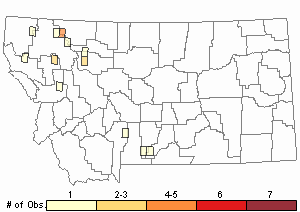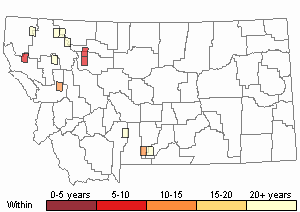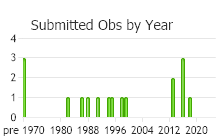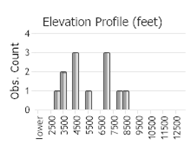View in other NatureServe Network Field Guides
NatureServe
Montana
Utah
Wyoming
Idaho
Wisconsin
British Columbia
South Carolina
Yukon
California
New York
Limprichtia Moss - Scorpidium revolvens
Other Names:
Drepanocladus revolvens, Limprichtia revolvens
General Description
Plants: Medium-sized to occasionally large when growing underwater, green, red, red with purple, deep brown, or black tones (FNA 2014). Stems 3-10 cm (Lawton 1971), meagerly and erratically branched or occasionally somewhat pinnate, the shoot tips not hooked; hyalodermis fully formed (FNA 2014).
Leaves: Stem leaves ovate or more lance-shaped, progressively or seldom suddenly tapering to the apex (FNA 2014), somewhat abruptly curved apically and facing toward one side of the stem, concave above and plane below, not pleated, 2-4 mm in length, 0.5-0.8 mm in width; margins smooth; base not extending along stem (Lawton 1971); apex short- to long-acuminate; costa solitary, extending past mid-leaf (FNA 2014). Exterior bracts surrounding the archegonia lack a costa; the inner bracts are up to 4 mm in length, have smooth margins, a long slender apex, and a costa that reaches to a little past mid-bract (Lawton 1971).
Leaf Cells: Alar cells 2-10, highly inflated, thin-walled; medial laminal cell ends usually narrowly short- to long-tapering, seldom rounded or nearly square (FNA 2014), not pitted (Lawton 1971); basal cells shorter than medial cells, the walls usually pitted (Lawton 1971).
Diagnostic Characteristics
Limprichtia revolvens and Scorpidium cossonii are often confused but may be distinguished by the following: S. cossonii is dioicous and has shorter medial laminal cells with squared to shortly-tapered narrow ends; L. revolvens is autoicous and has short- to long-tapered narrow ends (FNA 2014).
Range Comments
Greenland; St. Pierre and Miquelon; Canada: AB, BC, MB, NL, NT, NT, NU, ON, QC, SK, YT; USA: AK, CO, ID, MI, MN, MT, OH, VT, WI, WY; South America; Eurasia; s Africa; Pacific Islands; Antarctica (FNA 2014). In Montana: Flathead, Gallatin, Glacier, Lake, Stillwater, and Teton Counties (Elliott 2016).
Observations in Montana Natural Heritage Program Database
Number of Observations: 21
(Click on the following maps and charts to see full sized version)
Map Help and Descriptions
Relative Density

Recency



 (Observations spanning multiple months or years are excluded from time charts)
(Observations spanning multiple months or years are excluded from time charts)
Habitat
Mineral-rich soil and peat in calcareous fens and other wetlands (Elliott 2016). Low to high elevations (FNA 2014).
Reproductive Characteristics
Autoicous (FNA 2014). Seta 3-4 cm in length. Capsule bowed, slightly ribbed; theca 2-2.5 mm in length; operculum approximately 0.7 mm in length, cone-shaped (Lawton 1971).
Stewardship Responsibility
References
- Literature Cited AboveLegend:
 View Online Publication
View Online Publication Elliott, J.C. and A.K. Pipp. 2018. A Checklist of Montana Mosses (1880-2018). Updated 3 January, 2020. Montana Natural Heritage Program, Helena, Montana. 73 pp.
Elliott, J.C. and A.K. Pipp. 2018. A Checklist of Montana Mosses (1880-2018). Updated 3 January, 2020. Montana Natural Heritage Program, Helena, Montana. 73 pp. Flora of North America Editorial Committee, eds. 2014. Flora of North America North of Mexico. Volume 28. Bryophytes: Mosses, Part 2. Oxford University Press, Inc., NY. xxi + 702 pp.
Flora of North America Editorial Committee, eds. 2014. Flora of North America North of Mexico. Volume 28. Bryophytes: Mosses, Part 2. Oxford University Press, Inc., NY. xxi + 702 pp. Lawton, E. 1971. Moss Flora of the Pacific Northwest. Hattori Botanical Laboratory. Japan: Yamabuki-cho, Shinjuku-ku, Tokyo. 362 pages plus appendices.
Lawton, E. 1971. Moss Flora of the Pacific Northwest. Hattori Botanical Laboratory. Japan: Yamabuki-cho, Shinjuku-ku, Tokyo. 362 pages plus appendices.
- Additional ReferencesLegend:
 View Online Publication
View Online Publication
Do you know of a citation we're missing? Elliot, J. C. 1993. Second checklist of Montana mosses. Unpublished report. U.S. Forest Service, Region 1. Missoula, MT. 45 pp.
Elliot, J. C. 1993. Second checklist of Montana mosses. Unpublished report. U.S. Forest Service, Region 1. Missoula, MT. 45 pp. Lawton, E. 1971. Keys for the Identification of the Mosses on the Pacific Northwest. Reprinted from 'Moss Flora of the Pacific Northwest'. Published as Supplement No. 2 of the Journal of the Hattori Botanical Laboratory. Nichinan, Miyazaki, Japan. 66 pp.
Lawton, E. 1971. Keys for the Identification of the Mosses on the Pacific Northwest. Reprinted from 'Moss Flora of the Pacific Northwest'. Published as Supplement No. 2 of the Journal of the Hattori Botanical Laboratory. Nichinan, Miyazaki, Japan. 66 pp.
- Web Search Engines for Articles on "Limprichtia Moss"





